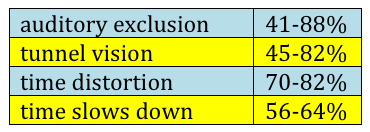Fighting for your life is likely the most stressful event any person can experience. That stress affects your performance: some of it good, some of it bad. This is the first in a series of articles that will explore what this stress is, and what it does to your body.
Survival Stress
Survival stress is caused by a perception of an imminent threat of harm. The seriousness of the perceived threat causes a proportionate amount of stress on the body. Additionally, if the individual is surprised, or has very little time to react, the amount of stress increases.
For example, willingly entering a MMA competition will likely cause a moderate amount of stress, whereas being attacked suddenly in the parking lot by a knife-wielding thug will probably cause an extreme amount of survival stress.
Survival stress is also referred to as “body alarm response” (BAR) in some of the literature. Regardless on what you call it, it causes some pretty predictable reactions in the body.
SNS Discharge
In a state of relaxation, the body is operating in parasympathetic mode. When encountering survival stress, or BAR, the sympathetic nervous system (SNS) kicks in. The amount of response from the SNS is proportional to the amount of survival stress encountered. More stress means a greater SNS response.
When the SNS system kicks in, there are very significant physiological changes in the human body. Some muscles will be activated, while the endocrine system will dump chemicals, like adrenaline, into the bloodstream. This is loosely known as the “fight or flight” reaction.
The physiological changes in the body include perceptual narrowing, cognitive disruption, and motor skill alteration. These areas are not comprehensive, and they do overlap.
Perceptual Narrowing
When engaged in combat, the brain will often focus on the one sense that is providing the most amount of information about the threat. Most frequently that sense is vision, meaning that the other senses, like hearing, may be diminished or turned off altogether.

Keep in mind that every person does not respond exactly the same way in similar circumstances. There are far too many variables to establish any absolutes. However, studying physiology and interviewing survivors of violent confrontations do give us insight into what someone is likely to experience.
Looking at multiple studies of police officers involved in deadly force encounters, research has shown officers frequently experienced auditory exclusion (diminished or no hearing), tunnel vision, and time distortions (most frequently time slows down.)
The effects of the SNS discharge on vision are extreme, and warrant their own discussion. But for the purpose of perceptual narrowing, the effect is the loss of peripheral vision and literally a narrowing of the vision. This means a second assailant may go unnoticed if they are not directly in front of you.
Auditory exclusion is the body’s way of trying to prevent information overloading the brain when processing the threat. However, when this sense is severely limited, you may not hear a loved one shouting a warning or other important information.
Consider this awful possibility: you are attacked by a predatory criminal and defend yourself with a handgun. Immediately after the shooting, a police officer arrives on scene and doesn’t yet know if you are a citizen who lawfully defended yourself, or the perpetrator of a murder. The officer shouts for you to drop the gun. You, suffering from diminished hearing, know someone behind you said something, but you couldn’t hear what was said. So, you turn (with gun still in hand) toward the voice. I think you see where this could go.
Time distortion is also a likely experience. For a few people, time speeds up, so that the entire encounter seems to be running at double speed. People experiencing this have reported that they felt like they were trying to “catch up” to the events unfolding around them.
Most people experiencing time distortions perceive that time slows down. To them, everything seems to be moving in slow motion. I happen to be one of the people that has experienced the slowing of time. From my own experiences, everything appears to slow down to the point where I can consider many different things, including thoughts that are weirdly unrelated to the fact that someone is trying to kill me. But, the way time slowed down, it seemed I had plenty of time to consider the threat, and other things, even though mere fractions of a second were passing.
In the coming weeks, I will explore other effects of combat stress on the body.
One reply on “Stress in Combat”
This kind of information should be discussed at every firearms and defensive tactics course given. Great insight and understanding of how the body works during high stress situations, and something that every officer and citizen should realize WILL HAPPEN when the time comes to confront the threat. This is exactly why in firearms training and defensive tactics training officers should be trained that once the initial threat is immobilized to begin a 360 degree threat assessment to pick up other threats. Don’t count on your hearing or “sixth sense” in these situations – most likely you will have to look directly at the next threat before realizing they are a threat. I look forward to learning more, reviewing information already learned, and preparing myself physically and mentally to overcome (as best as possible) the effects of the SNS in these situations.
Aaron